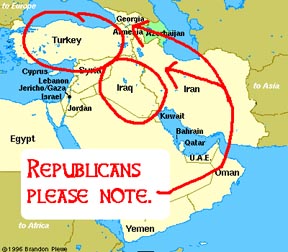Sometimes the worst evil is done by good people who do not know that they are not good. — Reinhold Niebuhr
Via Avedon — David Gerrold has written a post reflecting on the nature of evil. One of his points is that the way evil is usually portrayed on television and in the movies is phony.
People like to pretend — they like to pretend to be vampires and monsters and princesses and Vulcans and whatnots.
And that’s what most Hollywood evocations of evil are — people pretending, because they have no sense of the reality. That’s what was wrong with this particular recreation of the Manson Family; they played it like a bunch of teenagers giddily enjoying their own awfulness. …
… in this show, evil wasn’t portrayed as evil, but as a bunch of Hollywood actors pretending to be evil, chewing the scenery, baring their teeth, flashing their eyes, and practicing their wicked laughs — bwahahahaha. It was pretense.
Real evil looks very different from Hollywood evil.
Hannah Arendt, in her book about the trial of Adolf Eichman, the architect of the Holocaust, Eichmann in Jerusalem: A Report on the Banality of Evil writes of how she sat there day after day, trying to understand how a mild-looking human being could have authored such monstrousness. Ultimately, she coined the phrase “the banality of evil” to describe the essential thoughtlessness — ie. without thought, without feeling, without compassion — that results in evil deeds. The monsters of the Holocaust weren’t monsters, they were acting without regard, without conscious awareness, without empathy, without connection to the larger spiritual realm of humanity.
For a long time I’ve noticed that when racists are portrayed in films they are nearly always depicted as people who are scowling (or smirking) and disagreeable all the time; think Rod Steiger in The Heat of the Night. Yet in my experience — I grew up in an all-white redneck zone — racists can seem to be lovely people in any other context; they can be soft-spoken, considerate, and reasonableness itself except on the matter of race. It’s as if some part of their conscience were missing. It can be hard to grasp that nice Mr. Smith who voluntarily cuts the grass on the church lawn, or sweet Mrs. Johnson who bakes pies for the old folks’ home, would be capable of evil. Yet history tells us that a whole lot of “ordinary” people have taken part in evil acts in the past.
Gerrold writes, “I think evil occurs as a complex cocktail of forces.” I suspect most people are capable of evil if they get caught up in these forces. This is not an excuse for evil, but a warning to take care to recognize those forces and avoid them. People fall into evil because they don’t recognize evil as evil. They mistake it for justice, or righteousness, or even God’s Will.
“Evil does not see itself as evil,” writes Gerrold. “Those who commit evil acts do not see those acts as evil or even malicious. They see themselves as justified.” This is exactly right.
Osama bin Laden and his 9/11 flunkies believed their terrorist attack was righteous and justified, as did Tim McVeigh when he blew up the federal building. Even the all-time great evildoers like Hitler and Stalin and Mao no doubt rationalized their actions as serving a greater good.
A couple of years ago I argued that most of us think of evil as an intrinsic quality that some people have and others don’t, or at least have very little of. If you see evil that way, the next step is to assume that “evil” people are so dangerous and corrupted that “good” people are justified in whatever they do to get rid of them. Thus, “evil” and “good” people are different not because of what they do, but because of who they are. But when you start thinking that way, you’re opening the door to evil and inviting it in.
There’s no question that what took place in that prison was horrible, but the Arab world has to realize that the U.S. shouldn’t be judged on the actions of a…well, we shouldn’t be judged on our actions. It’s our principles that matter, our inspiring, abstract notions. Remember: just because torturing prisoners is something we did, doesn’t mean it’s something we would do. — Rob Corddry, The Daily Show
How many times have you heard a rightie say something like this —
The difference between you and me is that, deep down inside, you cannot accept the fact that there are truly evil people in the world. The difference between the liberal and conservative viewpoints boils down to this: you think that, deep down inside, the Islamic nutjobs really only want to have a nice house and a yard, and raise their children in a loving and safe environment, just like all the people you know. Whereas I think that they are truly evil people, like the Nazis, that want more than anything else to destroy all that we hold dear. And they are more than willing to sacrifice their lives, their families, everything in their hatred of all that is good and beautiful.
What most righties don’t understand about evil is how seductive it is. The seduction begins with the notion that “his hatred of me is evil, but my hatred of him is justified.” The fellow who wrote that paragraph may not yet be completely besotted with evil, but he is sure as hell flirting with it.
I say evil is as evil does. It’s not who you are; it’s what you do, that is evil. Or not.
Again, I’m not saying that evil acts should be forgiven, or that people shouldn’t defend themselves from evil or seek to apprehend or even destroy dangerous people before they can harm others. I’m just saying that as we do these things, we must take care not to be seduced by evil ourselves. And that’s hard. It takes a lot of self-honesty and self-discipline.
And it takes recognizing evil as evil. Evil doesn’t wear a big E on its T shirt. Evil can seem to be virtuous. It flatters your ego. And it can feel really good.
See also: Jill at Feministe, “God and Abortion Rights.“

 There is a direct connection between couscous and Osama bin Laden. Be warned.
There is a direct connection between couscous and Osama bin Laden. Be warned.